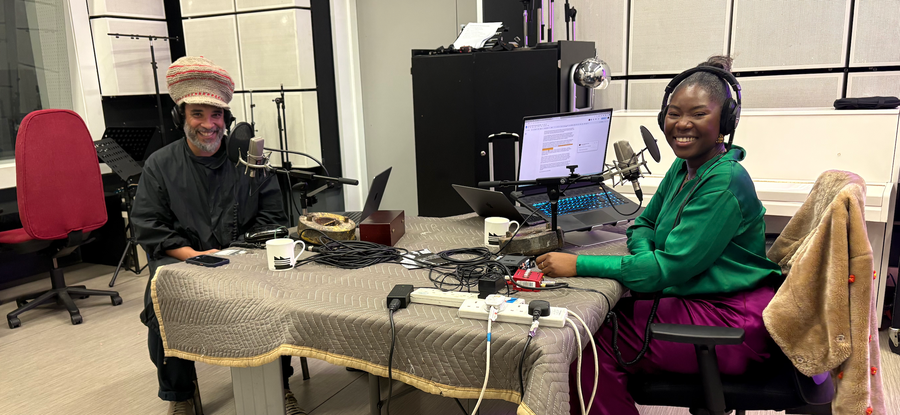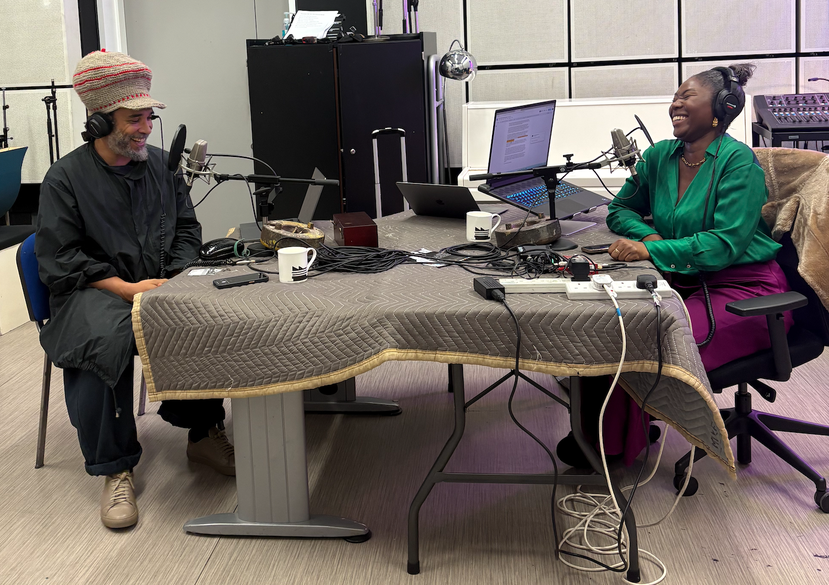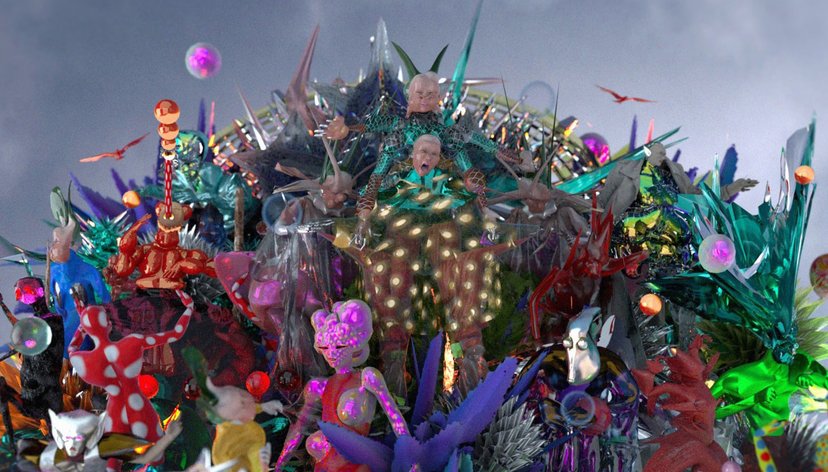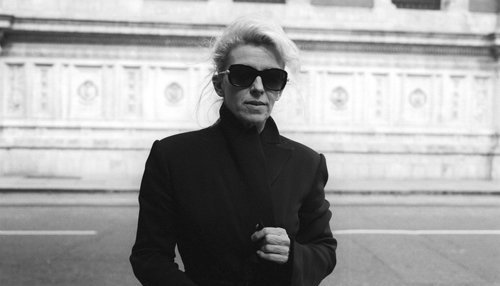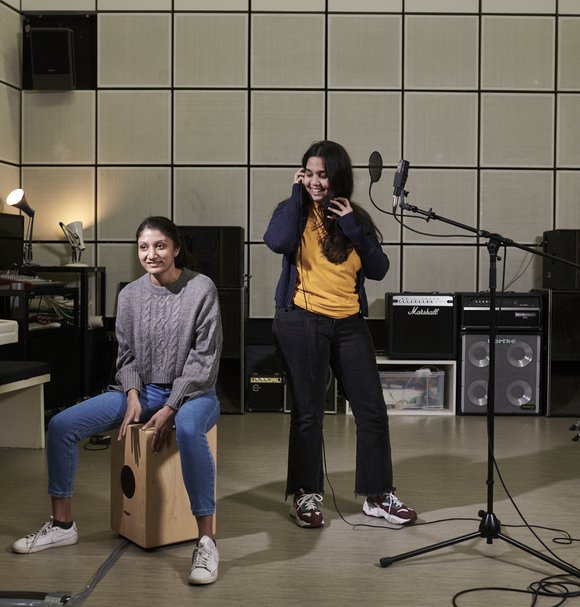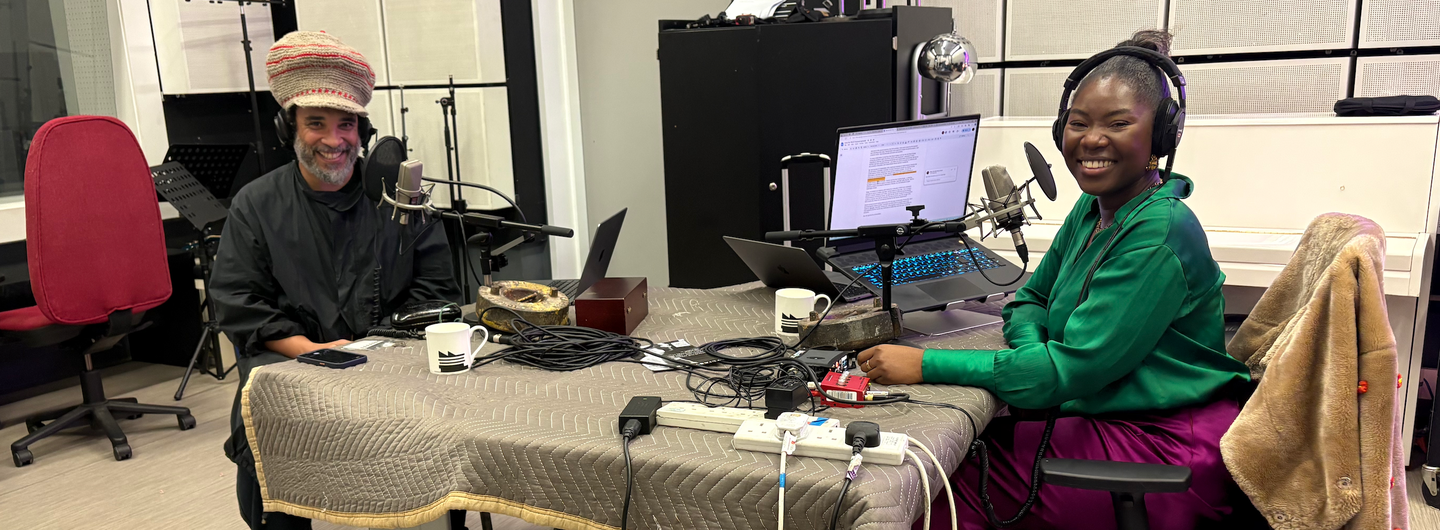
What does a genuinely ‘decentered’ space look like in creative education and the fashion industry?
Ahead of the upcoming FACE (Fashion Academics Creating Equity) Summit at the Royal College of Art on November 7-8, 2024, we explore the deep, systemic work necessary to create fairer, more inclusive spaces within the arts and education.
FACE (Fashion Academics Creating Equity) is a pioneering collective founded to confront inequities in creative education, championing the intersection of fashion, art, and academia as a force for meaningful change.
This episode’s host is Joyce Addai Davis - an RCA Fashion MA graduate, footwear designer, and the first Black female academic in RCA’s Fashion Department. Joyce shares insights from her journey in academia, where her work bridges sustainable fashion practices with critical questions about waste and equity.
Joining her is Andrew Ibi, a co-founder of FACE, creative director and fashion curator, who recently curated “The Missing Thread” exhibition at Somerset House. With his extensive experience as a course leader at Liverpool John Moores University and as an external examiner at RCA, Andrew brings invaluable insight into what it takes to create decentered, inclusive, and anti-racist spaces.
In this episode, Joyce and Andrew discuss:
- What it means to “decenter” a space in education and industry
- FACE’s upcoming summit at the RCA
- Joyce's experience studying on the Fashion MA at the RCA, under the leadership of Zowie Broach
- Practical steps institutions can take today toward a more equitable future for all
Listen to the episode on Spotify, Apple Podcasts and YouTube Podcasts.
Transcript
This episode was recorded on Friday 1 November 2024.
Joyce Addai-Davis
And I was literally scratching my head. Am I black? Oh my God. This is a space for me, and it was just so refreshing to know that I can be authentically self. And I am encouraged to be authentically self. And this is the first time in my educational journey where I can explore that.
Joyce Addai-Davis
What does a genuinely decenterd space look like in creative education and the fashion industry? Welcome to this special episode of the RCA podcast, where we are exploring this question and reflecting on the deep, transformative work required to create educational spaces in the fashion sector that are genuinely anti-racist and equitable.
Hi, I'm Joyce Addai-Davis a graduate from the Royal College of Art and the first black female academic in the RCA fashion MA programme. I graduated in 2023, supported by both Frank Bowling Scholarship and a Leathersellers scholarship. My time at RCA has been a profound journey, one where I've come to embrace my authentic self as a creative, a storyteller, and a black British female in academia. My work focuses on sustainability. I explored waste streams between the UK and Ghana, focusing on footwear waste.
I've been honoured to present my research at the United Nations Ghana. Centring my work around a guiding question if it can't be dismantled or absorbed by the Earth, should it really exist? My focus is on the afterlife of fashion and how we embed the dismantling processes at inception of design in the hope to find more subtle solutions. I'm also a proud member of FACE (Fashion Academics Creating Equity), a collective founded to tackle systemic issues in creative education, especially within the arts.
FACE is driven by a belief in the powerful intersection of fashion and academia to spark meaningful change. Today, I'm thrilled to be speaking with Andrew Ibi, co-founder of FACE and a dedicated advocate for equity in the creative education. Andrew wears many hats. He's a creative director, a fashion designer, and a curator. Recently, having curated the amazing ‘The Missing Threads’ exhibition at Somerset House, he leads the V&A Fashion Design and Communication course at Liverpool John Moores University, and we're proud to count him as a part of RCA’s community, where he's an external examiner for the fashion department.
FACE is an annual summit is taking place at the RCA this year on November 7th and 8th. It will bring together industry leaders, innovators and RCA alumni to explore what it truly means to decenter education. Andrew and I came together to kick off this conversation on how academia and the industry can collaborate to create fairer and more open spaces for everyone.
So let's get this conversation started.
Welcome, Andrew.
Andrew Ibi
Thank you for having me.
Joyce Addai-Davis
Thank you for being here. What is FACE and how did it come about?
Andrew Ibi
FACE. FACE. So FACE was an idea. It was the simple idea. So in the wake of George Floyd, we decided that we need to get together, and we need kind of answers, really, and progress. And so it was it was an idea about how many black fashion academics are there in the land and what would happen if we all got together. And we all formed a group, a merry band of black fashion academics.
Joyce Addai-Davis
Creating equality.
Andrew Ibi
Creating equality. And we spoke and we tabled, you know, our experiences. And then from there we developed some sort of strategic plan to tackle the inequality in the arts education. So fashion academics creating equality quickly became fashion and the arts creates inequality.
And I think that sort of, allowed us to capture different voices from up and down the country, different intersectionality, which was also really important. So do note that you're the first black woman academic at the Royal College.
Joyce Addai-Davis
Yeah, in the faculty.
Andrew Ibi
Right. Which is bonkers. Sounds mad to say it, but that kind of progress was where sort of FACE stepped in and we decided, well, actually, this isn't going to happen without collective, without a community, of kind of major operators as well, because it's not like we were all, you know, part timers, some of us had incredible positions in these institutions.
So we had big, powerful voices. It's just the, you know, in isolation, it's like you're talking in an echo chamber. So, getting everybody together.
Joyce Addai-Davis
Yeah, just like church.
Andrew Ibi
I remember like church. It was like. It was like therapy or a church. And some of those early conversations were, it just pure trauma, really. But the recognition or the realisation that we were all going through similar dramas within our own institutions and historically as well.
So the experience of that, made us understand that, that, you know, there was a necessity. So it was a conversation with actually, it was Sarah Mower that put me in contact with Pascal. And then and then we found Sharon. Yeah. The Three Musketeers. You know, we got ourselves out. Yeah. An event, you know David Campo and all sorts of people just came together.
It was in our own time. Yeah. You know it took up a lot of energy, a lot of space. Those early meetings were like yeah. Oh wow. Yeah. Like 3 or 4 hours long
Joyce Addai-Davis
Myself and Jacob used to do clubhouse.
Andrew Ibi
Clubhouse, Sunday Clubhouse. So really just and finding that strategy. And then there's this point where really it gets, it grows, it's really prominent.
We start having summits. So we had one at CSM. And of course, this one is, you know, Royal College of Art. We start putting out surveys. So we capture the student voice. We have one out at the moment. So we're speaking to academics. It diversifies them being solely about black and brown. This to include allies.
So the organisation just kind of grows but it's not so big that it doesn't feel like family still, because I think that's the other thing.
Joyce Addai-Davis
It's always been family. I feel
Andrew Ibi
It's all about family.
Joyce Addai-Davis
What does it mean to decenter a space, particularly in the context of higher education and industry?
Andrew Ibi
Yeah, so we've had lots of conversations around this concept of decolonisation, which is, you know, it's a great word and it's a very kind of direct word.
But I think that decentring maybe is an evolution in a way, because it really it really allows people, I think, freedom, democracy to put themselves central to anything. So if you decenter space, it means you take away the kind of the hierarchal structure and power that existed and you and you replace it with new perspectives, new voices, new people.
And so all you're really doing is saying, okay, well, what is HE at this point? You know, who has power? Where are the voices coming from? Where did those voices come from in the first place? And what if you just kind of shift the focus onto somebody else or somewhere else? And, and I think that decentring becomes really kind of easy to understand.
And I also believe that more people can get involved with that as a kind of a concept and will feel empowered by it. Because decentring, I think at the heart of it deals with intersectionality as well, you know, because it just, you know, sometimes when you use the term decolonization, it can be alienating some you. But when you talk about decentring and we're talking about allies as well, the language for me is, is so much stronger, you know, and it empowers people.
You know, I think the in the context of fashion, for sure, because you really do then take it away from the structure of, you know, Western kind of elitist perspectives. And you say, well, what if it's somebody else could contribute to this conversation?
Andrew Ibi
There's a question that many people ask, and I just feel like I will just put it out there, like, what does a genuinely dissented anti-racist institution look like in practice?
I don't think it exists right now, because I think that the conversations we have, just have always been centred on a specific, singular perspective. The conversations we're having now, a vast and richer, they're way more richer, you know, the, the talking about inclusivity and people having voices. I think we're just at the start of that process and we're still kind of sparring as well because of course there's so much kind of pushback as well, where do I fit into this.
And so we feel decentring. Well what about me. Yeah. So you can also be part of that conversation. What we're doing now is just kind of sharing, you know our voices. Yeah we're amplifying our voices together. So it's not just about one perspective. So in terms of an institution that exists at this point, I would say it doesn't exist.
And even in places where you would imagine there to be dissenting voices. So let's just say Ghana, Nigeria, we're talking about homelands, the perspectives of you know, education. there is still very much focused on Western ideas. So even though space is where there is potential to have conversations about, you know, what are we doing here? What's out, what's in fashion terms, what we where, you know, perspective have always been focused on someone else.
So it doesn't really exist now and then and, but nothing globally. Now, what we're doing is we're kind of pulling it apart brick by brick.
Joyce Addai-Davis
Yeah. I’d just like to interject on that. I can only go by experience. And two years ago, I came to the RCA as a person that wanted to explore and understand self, having been in the UK educational system for over twenty odd years, never really got an opportunity to explore my blackness and self and didn't even know I was allowed to. Like it is just wild
Andrew Ibi
It is wild, it is wild.
Joyce Addai-Davis
And it was literally on the first day or the first week. It was this kind of like a full immersion weekend. Zowie Broach is the head of program of fashion. Okay. We, created, a week where we had people like Harris Elliott, who spoke about Wu-Tang clan and, what that meant to what was community.
And then we had Le Sebo, who was based in South Africa, talking about heritage and identity. And I was literally scratching my head, am I black? Oh my God, this is a space for me. And it was just so refreshing to know that I can be authentically self. And I am encouraged to be authentically self. And this is the first time in my educational, journey where I can explore that.
Nowhere, I would say nowhere is perfect, but I feel first-hand that I've experienced that.
Andrew Ibi
Yeah. I mean, you know, Zowie's perspective on fashion is incredible anyway. And I think what she's she's, brought to the Royal College of Art is, is, a broader understanding of culture and its place in fashion. Right. So. And as soon as you start to recognize that fashion is not just about clothes, and it's really about how we walk and how we sound and how we dress and the music we make and, you know, so forth.
Right. You realise the impact of other cultural interventions on fashion. Once you understand that, you realise where the if you like, the spark comes from. So you know what I say, if you want to speak streetwear as being the kind of most powerful driver in fashion right now, you only really need to trace back to its roots and you understand the imprint of blackness on fashion.
Now, that imprint, ultimately, if you're not teaching at an institution, you're doing your students a disservice. And, and I think that the other thing that when we talk about black culture is, you know, the economic strength and power of the two. So, again, if you're not teaching students about the economic power of, of black culture and its imprint on the world, yes, then you're doing a disservice again, because how are they going to operate?
Yeah. If you go and work for, you know, deal. Now wherever there's a sense or Burberry, it doesn't matter where you're working. There's a sense you need to understand a more diverse, fashion language that's inclusive of all people now. Yeah. But also, you also need to know how not to make the mistakes that designers made in the past.
So we don't talk about ethnic clothes anymore. That's gone. We don't talk about Orientalism anymore. That's gone. So we need the right language in place because you're now operating on a global scale, partly because technology's role in decentring has really, you know, helped, you know, for the whole landscape to change. So, you know, through technology, everybody can be part fashion now.
Everybody can make music. Yeah. You know, everybody can create a brand. Yeah. And and people do. And they have very powerful voices. And so the gatekeeping of that keep something centred is kind of been slightly I'd say it's been torn down. It's. Yeah. Oh wow. I don't really need it anymore. I really love the way you. Yeah. You realise that.
Wow. Yeah. Because my job was to deal with, you know, suddenly we don't need Vogue. Suddenly we don't need kids, don't need Vogue. Never need. You don't need to tell kids how to dress. They have their own communities that give them that information. So you do have to go back and understand, you know, what are these mediums for?
You know, fashion magazines were to tell the people, it was a means of communication. But if that's all around you now, actually, what do those institutions need to do now? The clever ones are moving with culture. But the ones that are kind of stuck in the mud that they that sort of becoming slightly useless. Yeah.
So I think that thinking about face in the context of, you know, and your context as is used a student the Excellence Prize. Yes, has also been another way that we've seen, these different voices come to the fore and speaking truth. Yeah. What was different before that, that they weren't necessarily being acknowledged or there wasn't a space for the voices and fashion couldn't see a way, to even monetize or to understand how important these voices were because it just was not looking in the correct direction.
So it's not like culture didn't exist, it's just that they weren't looking. And so, you know, it was, you know, working on something like the missing thread. That project, the curation of that show, that Somerset House, you know, that told stories that well we, we, you know, we build it as untold, you know, fashion stories in black culture because we recognize that a lot of these stories were missing from the lexicon of fashion.
So those stories, once you understand that those stories have the place in fashion that you realise that you know how important is fashion and how important is culture to fashion, okay. And then you have to decenter your thinking or else economically you lose out anyway. And I think that's the other thing that, you know, when we talk about inclusivity and diversity and drives towards equity, you know, businesses are now equating that with value and economics. So you know, let's not you know, Edward Enninful at Vogue was a powerful economic move. You know, Vogue was honestly on its last legs and actually Edward breathed new life into every perspective. But also economically, it meant more to a global majority. So, you know, the decentring again, that was that's an almost an action of decentring.
If you if you think about Vogue as a, as a white elitist fashion institution moving towards a black, you know, editor and how that introduced Vogue to, a new space. Yeah. And a wider, wider audience, but also introduced the existing audience to new conversation pieces. And so that that that kind of shift of the centre slightly, let's just say slightly to the left. The doesn't matter or up or down doesn't matter which direction it goes in, but towards a different audience actually creates new things to talk about as well.
Joyce Addai-Davis
Well, let's talk about the face summit. So how can moments like the Face summit where industry higher education come together and drive towards forward change?
Andrew Ibi
Well, I think it's necessary at this point. Like we've had we've had fantastic traction with FACE and education and I think that we've done so much work, so much great work with education. But we are also, most of us are kind of thriving creatives operating within the industry as well. And many of us shut out, if you like, in the first round.
So, you know, let's just say the average age of, you know, members of face might be around, I'm going to say 45, and that's going to be kind, but I think we're probably 50, you know, so, our activity in fashion was at a time when black wasn't in fashion or not not black skin anyway. So now what we're seeing is that expertise as practitioners and as educators to this duplicity in, in, in, in the way we sort of act and the way we are and in our experiences is very rich and our connectivity to industry is very rich.
So, so the combining, if you like the combination of education and talk about fashion. The fashion and the current fashion industry pulling that together and having this broad discussion, somewhere like the RCA about the future as well. I think this is the other thing. It's celebratory. It's not, you know, we've had the pain and we've we've engaged with the trauma and we've, we've built FACE.
And in a way, now it's, you know, we have to FACE race Handbook, which is, which is a guide to our allies. Yeah. That's, a very strong, document and a very strong resource to move forward with. But, you know, as black people in fashion, we also want to celebrate, you know, the, the, the enduring activities of people like Joe Casey.
We always talk about Boateng, but there’s new people. You know, Martin Rose is doing amazing things at this point, right? Bianca Saunders, you know, so I think it's really, you know, the Adidas originals, it's amazing. You know, so suddenly we've got these kind of these global voices having these conversations. And we need to celebrate that, but also frame it and contextualise it or maybe even recontextualize it was probably contextualised before.
But to recontextualize those voices, you know, to a broader audience, I think now is is the time. Okay, great.
Joyce Addai-Davis
Well, that leads me to another question like, how can we effectively measure success in decentring spaces and building anti-racist frameworks?
Andrew Ibi
That's a really good question. And it's quite a difficult question to answer. Specifically, I don't have to answer that question such.
But what I do understand is that particularly Haiti institutions are very good at measuring collecting data and creating action plans. So the if you like. For me, that is really in in how the institution is beginning to respond to these challenges. So early doors we went to the we wanted to change the NSS. You know the National Student Survey.
We wanted to include questions around equity, race, inequality. Now, as soon as you have a question about race in the NSS and equality and decolonization or decentering of curriculums, institutions would have to respond to that. Then it would, there'd be a chain reaction of change, because what you have to do is make sure that your students and your curriculums and your environments and your spaces and your resourcing is adequate for that change.
So we all know that, you know, Covid happened and Covid was fixed. Racism has been around for a very long time. And so where there is a will, I'd say there's a way. And I think the groundswell that's beginning to happen because it could be economic as well, because you've got to remember that at this point, you know, economically institutions are struggling.
It is losing out. So, where is your customer? So maybe diversifying and changing, the perspective of your institution allows it to become a global player. So when that happens, then there's the opportunity to capture data and respond. Because everything we do in education ultimately is, is, is responsive. I - it drives me mad actually, because we respond, we're never really pre-emptive, which is this is sort of the difference between being a designer and somebody working in an institution.
We wait for the data to come in and then we respond. So I if I, if I sort of, if I over recruit, then I'll get more money. But I can't really speculate on how to make over recruitment happen. So sometimes I feel with education, that the wheels are a bit slow to turn. So you need, if you like, the evidence of, a decent curriculum attracting, a broader culture of students before the institution will respond, which is problematic, because nothing ever really changes.
So I feel like, to answer the question is really about, institutions have fantastic ways of measuring, capturing data and responding through action plans. But at this point, it's to me it's still not on their agendas. It's still not on their agendas.
Joyce Addai-Davis
What is one practical step that an institution can take today to work towards this vision of a decenterd and anti-racist future?
Andrew Ibi
I think, you know, when we start, when we really start to face, there was a real conversation about, you know, audience. There was a real conversation about who's delivering the audience and something I always say or said. I still say it, just employ some more black people. It's quite simple. Yeah. You know, some things are actually quite simple.
It's not it's not that simple, but. But it's a step in the right direction because I think as soon as you involve the right people in any organisation, there's a seismic shift and change in the mentality of that organisation. And, you know, it's power to encourage new voices. So, practically speaking, we started you know, there's a lot of institutions now looking at things like reading lists, looking at decolonisation as a practice.
There's a lot of research in that area. The REF for instance, it's coming up in 29. Must be 29. Could be lying. You know, there's a lot of research focus on EDI or, equality or equity. So a lot of the work now is happening within institutions. It's just really now, practically speaking, how it's embedded in but the whole change of, the decentring needs to happen from kind of the top all the way down, you know, thinking right across the boards, you know, you know, PVCs, VCs, Deans, the whole thinking.
And it needs to be kind of specific to industry because the arts is still lacking behind some areas, like business, we might find that there's a kind of a, a broader, recognition of, of, of sort of global culture and hopefully there's a kind of response on the ground. But in something like the arts in an area like the arts is still very stuck.
So there's a bit more work to do and a bit more of a shift. But yeah, practically, you know, decolonization, decentring curriculums, new voices, different voices, young voices, old voices. You know, any voice that is not represented creates change, but it also creates, new people. Right? New academic like yourself. Yeah. Because you realise there's a possibility.
There is, you know, and I think that's the other thing is, is how does education ultimately empower. Yeah. Students. Yeah. To then take the baton.
Joyce Addai-Davis
Yeah. Well this is going to get me to segue to, another moment. Okay. Where it was yourself, David Kapur and Harris Elliott, were you to a class an identity? That's right.
Andrew Ibi
That was about walking in someone else's shoes, right?
Joyce Addai-Davis
Yeah, yeah. And you told us to bring. I think it was like two objects that we could describe. And I think at the time, I bought, like, a really pointy boot and, a Ghanaian sandal. And that was my first introduction to footwear and waste. And I remember that class so vividly that I sent you through an email just thanking you about that moment. And I was a student. So literally, it's definitely an honour just to be in your space talking about that.
Andrew Ibi
I mean, for me, you know, having such a long time now and practice, you're unaware sometimes of the impact you have on people. You really are. It, you know, becomes your job to it, to a point. But to hear something like that, you realise if you amplify. Yeah, if you amplify, then there will be lots of choices and there's lots of Andrews. Yeah. So there's these opportunities for, for, a much, you know, more, you know, a growth that's so much more that would really maximise. And have a maximum impact on, on community. So you will have. A profound impact on the students that you're teaching here.
And sometimes you don't even have to say anything. It's just being there. Yeah. You know, one of the things I quite like doing is, is, Graduation. Yeah. And I'll always push myself to the front of the queue. Yeah. And every year I go to the graduation, I go to the gown in area and I say, oh, what you got for me is that I don't particularly like my own gown.
So I'm like, well, you go. I like green one. That's cool. Can I have that green one? So I just wear whatever I like because I'm Fashion! So every time I turn off it, it would look silly saying, oh, I was like, wait, what university? I thought, no, I just like the fact that it's great.
So let's push myself to the front. And I always like to lead the procession to the stage, because that visibility is so important for all of the black families and the students to see the black. I might be the only one as well, by the way. There might be one other, but just to see that is really important.
And if I'm not there, actually we're back to that old story. Yeah. You know, and the impact of our presence is so important. And you don't sometimes you don't realise it. And that's why I've never left education, because every time I try to leave, somebody says to me, but Andrew, if you leave, like he's going to do this.
And that was the other reason why face for me is so brilliant, because at some point I can leave now there's a battalion of, of, you know, of allies. Yeah. So, you know, the FACE Race Handbook. Which is a fantastic resource. But also not just for us, but for our allies. And it's really that that document is about us.
If you like collating our expertise and our thoughts and our ideas and our practices and our experiences and enabling our allies to use that information without us in the room, because we don't always want to be, you know, so. Oh, Joyce, do you want to talk about race today? Oh, Joyce, you talk about race day?
It's like, can't somebody else talk about race? And actually the answer in the past has been no. So I think sometimes and I've set this up because I've been told, but your voice is so important. And I said, well, maybe your voice is more important than mine. You imagine a white woman saying, what I'm saying. How important is that in my absence if I'm not there, if I've got a cold.
I can't make it into work or if I'm double booked. Yeah. What happens? That conversation goes flat. So we need to be able to, step away as well, you know, and have the conversation still happening. So resources that kind of expertise is so important. So important. So to get involved in FACE, you could go off to our website.
And you can obviously if you're a black academic or brown academic you can join. So you know, you can become a member. And of course we have our allies as well. So everybody can get involved in FACE. I think it's it's about, for me, it's always been about allowing black and brown voices to have space to talk freely.
But not exclusively. Yeah. So we've always encouraged, you know, broader, wider conversation pieces, but everybody can be involved in FACE and ultimately because of the nature of, of, of what we're doing, which is education and the arts, and it's born out of fashion. You know, that reaches it means that everybody needs to be involved really. You can't really be talking about the arts and fashion or the arts and, fashion and blackness or culture. You can't really dismantle those ideas. So the imprint. I think the imprint today it runs so deep, that there's no way you can kind of dismantle fashion or the arts from society and culture.
So it's everybody's business, really. And everybody's it's in everybody's interest to, to kind of understand these new perspectives. Particularly when we start talking about ideas around decentring.
Joyce Addai-Davis
Wow. It's been an absolute pleasure sitting in front of you and speaking today. I'm so honoured and I'm just looking forward to the future and how we really make true change. Yeah. And see a different world.
Andrew Ibi
Thank you so much. And I think the future is bright. As I said. Yeah, it's definitely bright.
Joyce Addai-Davis
I think that's a really pretty bow to end everything on this. Thank you so much.
Andrew Ibi
Thank you.
Outro
This podcast is from the Royal College of Art. Home to the next generation of artists, innovators and entrepreneurs and the world's number one art and design university.
And you can learn more about our programs at RCA.ac.uk, as well as finding news and events relating to the College. And our application portal, if you're interested in studying at the RCA.
